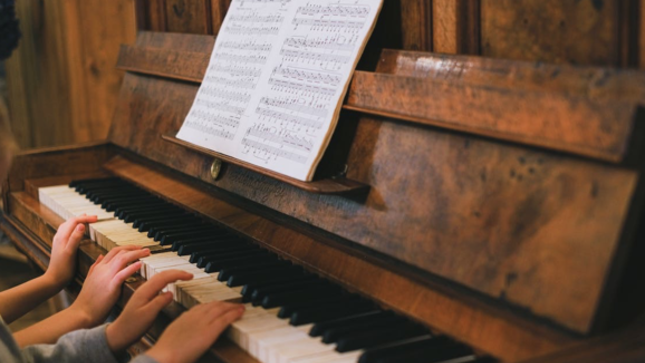
Have you ever thought about playing piano? Picking up a new hobby can be a daunting task, but learning how to play a musical instrument can bring joy and fulfillment to your life. Every year, millions of people take piano lessons to learn the magic of playing music. With online lessons more readily available to everyday people, the gift of playing the piano is more accessible than ever. While piano teachers may teach people how to read notes or understand piano techniques, appreciating the composition of the pieces you play is integral to bettering your skills.
What are piano compositions?
Some may think that piano compositions are the same as “songs,” but this isn’t true. Compositions usually indicate an instrumental piece, whereas songs usually include lyrics along with music. Piano compositions, or musical compositions in general, refer to the structure of a musical piece. This includes notes, melodies, rhythm, harmony, dynamics, and texture. A composer may choose to arrange these musical elements in varying ways. This makes each compositions special and unique in their own way.
A common way piano compositions are composed is to start off with a melody that will be central to the piece. The melody often lays the foundation for what the piece will become. After this, a chorus or bridge may follow. Choruses are a way for composers to explore their style and creativity. Most of the magic that comes from piano compositions is how the composer chooses to bend or follow the rules of these musical elements.
Breaking down a piano composition
An example to help understand the magic behind some of the most famous piano compositions starts with looking for musical elements that are familiar to you. Consider the following when you are listening or reading a piano composition:
Is there a clear melody?
What key is the composition in?
Are there any stylistic tools the composer is utilizing?
Is there a feeling I am getting when listening to this composition?
Is the piece getting faster or slower at different points in the composition?
While picking up on these musical elements may be difficult at first, overtime it will become second nature to recognize them. Practicing the piano compositions yourself can also help you gain a deeper understanding of the piece and the composer's intent.
Looking for musical markings on compositions may indicate certain musical elements. For example, many composers often mark at the beginning of each piece the dynamics for the compositions. Dynamics like crescendo or diminuendo can indicate when a section of piece should get louder or softer, this can communicate the feeling and mood the player is intended to convey when playing the piece.
Famous piano compositions
Some of the world’s most famous piano compositions come from classical genius such as Ludwig van Beethoven, Claude Debussy, Frédéric Chopin, Johann Sebastian Bach, and so many more. Apart from being great players, these artists also composed music that would be played for centuries. This is a brief list of some of the most popular piano compositions:
● Piano Sonata No. 14
● Für Elise
● Clair de Lune
● Minute Waltz
● Preludes in C-sharp minor
● The Heart Asks Pleasure First
While you may not like some of the most famous piano compositions, it is important to note that these compositions helped progress the genre by utilizing techniques no one had ever used before they were released.
Take for example Für Elise by Beethoven, this piece is known for its careful blend of the two stylistic movements that were taking off at the time of its release: classical and romantic. Its expansive and dramatic feel, while also being light and airy, was a combination of musical elements that would influence many different artists later down the line.
Another famous example is Clair de Lune by Debussy, this piece is known for its undeniable feeling of dreamlike melancholy. It’s peaceful, but somber nature, is easily conveyed through its rhythm and notes.
A great way to get recommendations for classic and famous piano compositions is to ask your teacher. They can often curate songs that may be more to your taste or that you’ll find as interesting as the ones listed above. You can also try and recognize musical elements in your favorite songs to help with your understand of musical elements in piano compositions
Why are compositions important to your journey of learning piano?
Understanding music theory and piano compositions can be a great way to improve your skills at playing piano. While it isn’t necessary, it does allow you to understand the pieces you are playing with more depth and understanding. Learning the creative process of the composer also helps inform your interpretation of the song, as well. In the end, you’ll have a much deeper appreciation for those that compose the music you play while you learn piano or improve your skills.